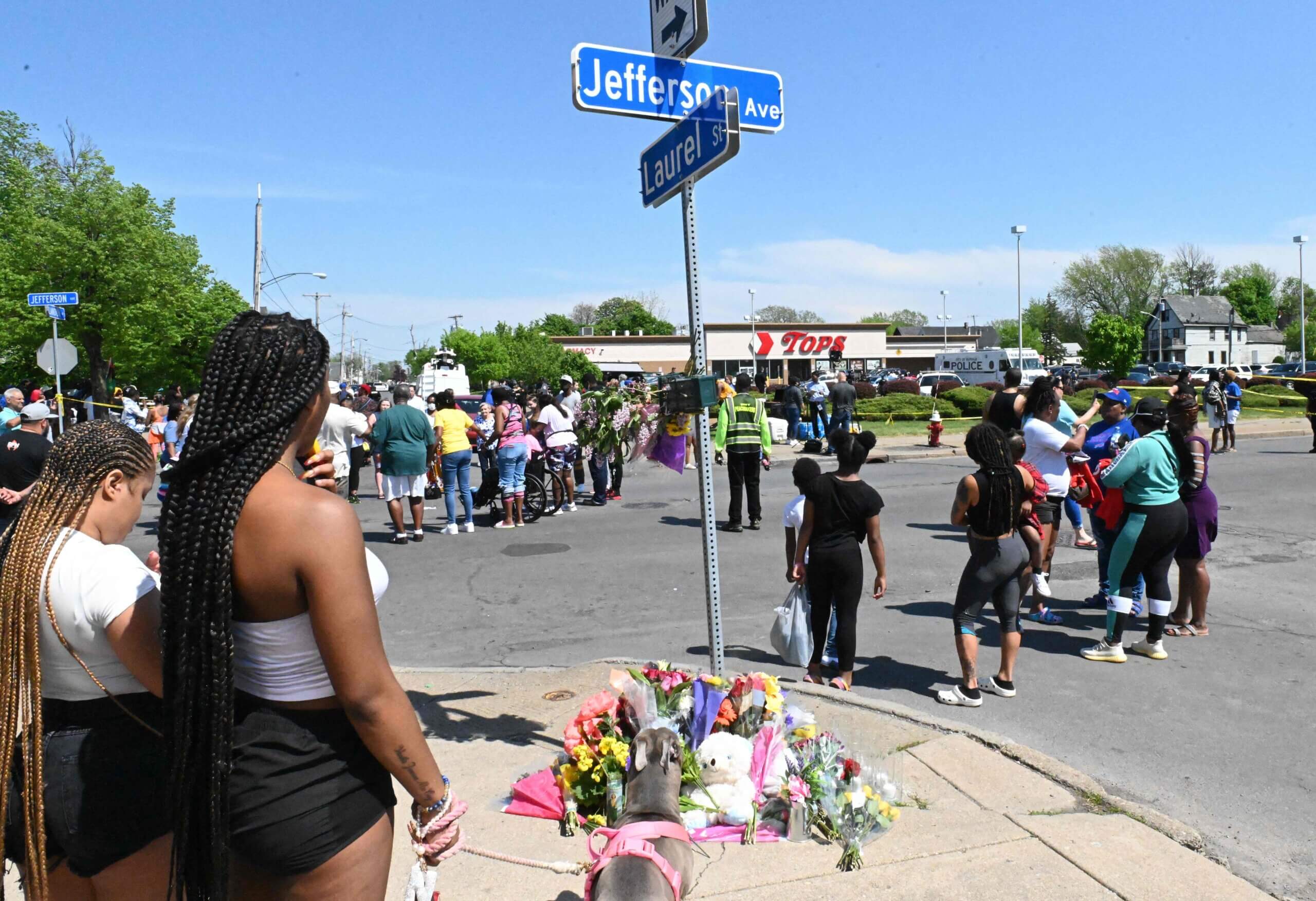‘A clarion call’: Buffalo’s Jewish community responds to mass shooting
Rob Goldberg, CEO of the Buffalo Jewish Federation, spoke to the Forward about how the organization is supporting the city’s Black community in the aftermath of the horrific attack.

Community members participate in an August vigil near Buffalo’s Tops Grocery store, the site of the mass shooting carried out by a white supremacist who targeted African-Americans, despite a manifesto that focused on his hatred of Jews. Photo by USMAN KHAN/AFP via Getty Images
A mass shooting at a Tops Friendly Market in Buffalo, N.Y. killed 10 and wounded three, and opened a national conversation about the insidiousness of the racist and antisemitic conspiracy theories that appear to have motivated the suspected shooter.
It also deprived a predominantly Black neighborhood of its primary grocery store. Beyond the Tops, the area is a food desert, with little access to affordable, healthy options for buying groceries.
In response, the Buffalo Jewish Federation has teamed up with the Buffalo Community Fridge, Black Love Resists in the Rust and other racial justice organizations to help close the gap.
Buffalo is one of the most racially segregated cities in America. While there is not a significant Jewish presence in Buffalo’s East Side, where the shooting took place, the attack reverberated throughout the city’s Jewish community. The president of the Buffalo Jewish Federation runs a steel company; one of his employees was killed in the attack, Rob Goldberg, CEO of the Buffalo Jewish Federation, said in an interview. And a leader of Buffalo’s Jewish Community Relations Council (JCRC) works for a state senator; one of his co-workers is the mother of one of the three people wounded but not killed in the attack. “It’s, like, two or three degrees of separation,” Goldberg said.
Goldberg’s interview with the Forward has been edited for length and clarity.
In the aftermath of the shooting, how is the Buffalo Jewish Federation responding?
The Federation and our JCRC put out a statement yesterday. It was important for us to express a message that we stand shoulder to shoulder, and arm in arm, with our Black community, which was the target of this horrific terrorist attack.
We have been developing and nurturing relationships with Black leadership since the onset of the JCRC five years ago. In 2017, we took a trip to Israel; we had 24 clergy, over a third of whom were Black clergy from our community, several of whom have churches or a presence on the East Side of Buffalo. The relationships that were developed — on the bus, at the Wall, over breakfast — have helped us during this crisis. We reached out to them, and we are taking our lead from what they feel is needed at this point.
It’s a two-pronged approach. Food insecurity is a major issue for that part of our community because this grocery store is the only one in that part of the East Side. The people in that neighborhood depend on that store to provide them with not only food, but other kinds of goods — diapers, formula, prescription medicine. The store is closed indefinitely because it’s now a crime scene, so there’s been a real concern about making sure that people in those communities have access to those resources. Even though the market is providing shuttle buses to other locations, we’re working closely with the community and channeling our community members to make contributions of both food and financial resources to FeedMore WNY.
The second thing is to be a presence for the community — to show up. And so we moved very quickly Sunday morning to get members of the Jewish community to come to an impromptu prayer vigil that we found out about late Saturday night. We had two dozen people there that were part of a crowd of about 150 to 175. It was important that we were there.
What other community needs is the Federation trying to meet?
I think what’s going to emerge from this incident is an opportunity for a more open dialogue between the Black community and the white community, between the Black community and law enforcement — all these issues that sort of bubble to the surface when something like this happens. We have been present, and we will continue to lend our voice — our voice of calm, our voice of love, our voice of care.
It’s the core value of Jewish community relations as we try to do tikkun olam, repair the world, and so we’re going to live that out. And we’re going to embrace any opportunity to be of more assistance.
What effect is this work having on you?
Our hearts are broken. It was very emotional to be part of the prayer vigil on Sunday; it’s a clarion call for us to do more to not stand by the sidelines and just watch, but to be involved based on how we can be most helpful.
How can Jews outside of Buffalo support the Buffalo community right now?
Checking in with us, asking “How are you doing?” and “What can we do to be helpful?” is so meaningful. And I’ve been steering people to this Facebook post that has a variety of different organizations that are providing food resources. That’s where the need is right now.















